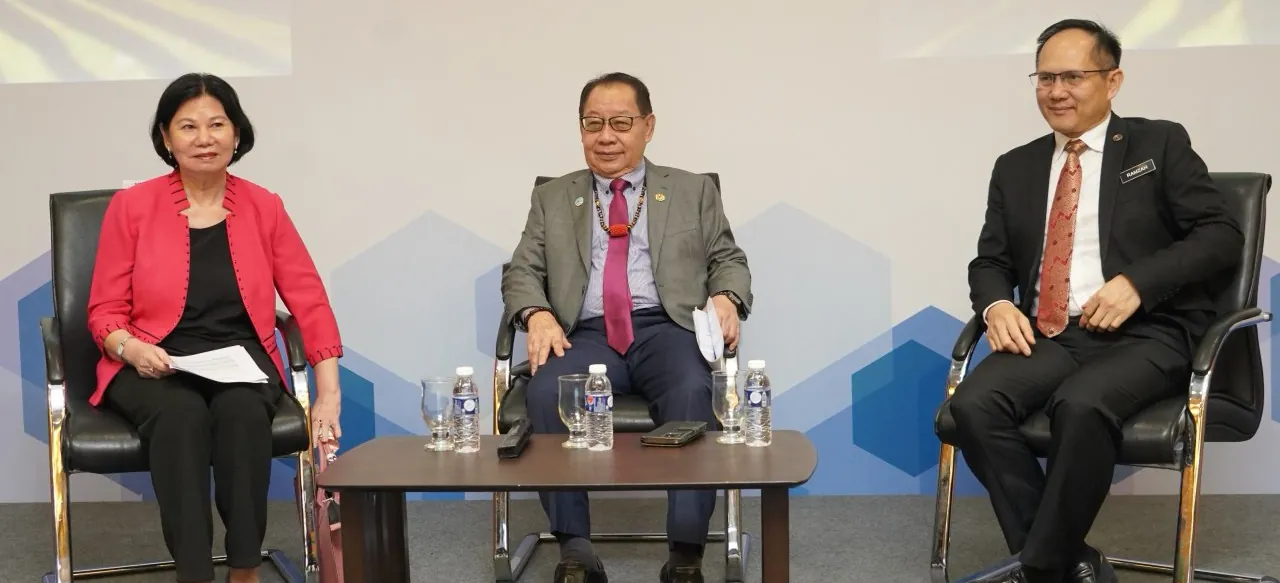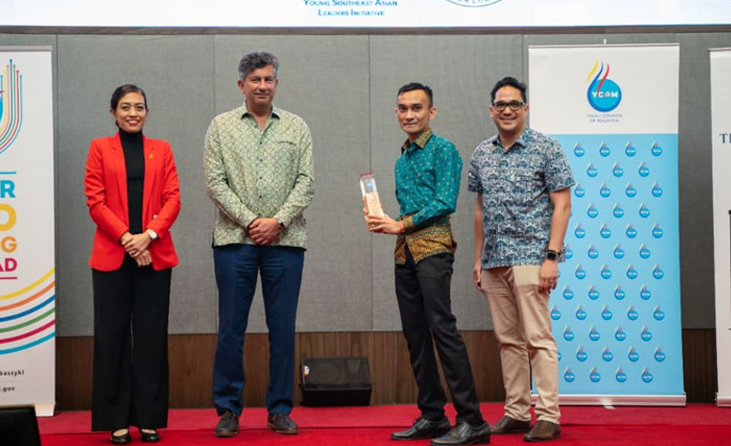
Jeffrey
KOTA KINABALU (Nov 21): The State Assembly today approved the Agricultural Produce Board Enactment (Amendment) 2024.
Agriculture, Fisheries and Food Industries Minister Datuk Seri Panglima Dr Jeffrey Kitingan said that the amendment to the enactment is both crucial and necessary to ensure the effective implementation of food security policies, particularly for the rice and paddy sectors, which are the staple foods of our population.
He said that Bill aims to amend the Agricultural Produce Board Enactment 1981.
“Its purpose, among others, is to broaden the general functions of any Board established under this Enactment and to include provisions related to enforcement to ensure that the proposed new functions can be implemented more efficiently,” he said.
He reminded the August House that the current instability in global geopolitics such as the wars in Ukraine and Palestine, the Taiwan-China conflict, and political tensions in the South China Sea, poses risks to Sabah’s food supply, particularly rice. Sabah heavily relies on imported rice from countries like India, Thailand, and Vietnam.
“Therefore, it is critical for Sabah to prioritise and ensure the security of its domestic food supply. This involves achieving self-sufficiency in food production to meet the needs of the population, especially in anticipation of crises that could escalate at any time,” he said.
He said that the need to focus on ensuring an adequate rice supply has become increasingly urgent due to the steady decline in the Self-Sufficiency Rate (SSR) for local rice, both in Sabah and nationwide.
“For example, Sabah’s local rice SSR dropped from 31.83% in 2010 to 27.52% in 2011, 25.65% in 2012, 25.54% in 2018, 22.81% in 2020, 22.60% in 2022, and further to 22.0% in 2023. At the national level, Malaysia’s local rice SSR declined from 63% in 2010 to 62.6% in 2022 and 56.2% in 2023,” he said.
He added that the decline in local rice SSR is attributed to several factors, namely, the aging farmer population and reduction in paddy field areas.
“Many farmers in Sabah are over 55 years old, leading to decreased productivity. Meanwhile, younger generations, often the children of these farmers, are uninterested in rice farming, opting instead for industrial jobs, even if it means relocating to Peninsular Malaysia,” he said.
Jeffrey also said that the amount of land dedicated to paddy cultivation has decreased significantly.
“Some paddy fields have been converted for housing projects, road construction, industrial developments, or abandoned. For instance, Sabah’s paddy cultivation area shrank from 38,000 hectares to 24,013 hectares by 2023,” he said.
And other contributing factors leading to the drop of SSR rate is the lack of agricultural machinery such as plowing tractors, transplanter machinery and combine harvester machinery.
“This caused many areas of paddy fields to be uncultivated and become abandoned paddy fields which now reach a total area of 8,000 hectares,” he said.
At the same time, Sabah is also experiencing increase in population, which causes the amount of rice consumption to also increase.
“According to the Department of Statistics Malaysia, the population of Sabah in 2010 was 2.9 million people, increased to 3.5 million people in 2023 and recently increased to 3.7 million people with Sabah having ranked second in terms of the most populous state after Selangor,” he said.
To overcome this matter, the Sabah Government under the leadership of the Gabungan Rakyat Sabah (GRS) unity government has identified the agricultural sector as one of the main sectors that is the core and focus to be advanced in the Sabah Maju Jaya development plan, he said.
Jeffrey also said that among the initiatives his ministry has implemented is the establishment of the Sabah Paddy and Rice Board (LPBS) which was established under subsection 3(1) of the Agricultural Production Board Enactment 1981 through notification in the Gazette on 23 May 2024 after this establishment was approved by His Excellency the – Sabah State Speaker on 26 April 2024.
“As of today, the government has appointed members of the Board of Directors of LPBS, General Manager of LPBS and identified the Deputy General Manager of LPBS. While other staff are in the process of appointment,” he said.
The Sabah government initially established the Sabah Rice Board (LPS) in 1967 under the Agricultural Produce Board Ordinance 1963 (No.23 of 1963)/Agricultural Produce Board Ordinance 1963 with the aim of advancing the rice farming sector, said Jeffrey.
“Among the targets set for LPS at that time was to achieve a production yield of 600 kilograms of rice per acre. But as of 1979, rice production was only 400 kilograms per acre. As such, LPS was dissolved in 1981 and its operations were taken over by the National Rice Board (LPN) which expanded its operations to Sabah that year.
“The dissolution of the LPS has caused the Agricultural Produce Board Ordinance 1963 to be amended to include a clause for the dissolution of the LPS and in the same year the Agricultural Produce Board Ordinance 1963 was repealed and replaced by the Agricultural Produce Board Enactment 1981 (No.18 Year 1981) / Agricultural Produce Board Enactment 1981.”
The amendment of this enactment is very important and needs to be made to improve and strengthen the jurisdiction of the Agricultural Production Board Enactment so that it can be used as a source of authority for LPBS operations, he said.
He added that the Enactment Bill of the Agricultural Production Board (Amendment) 2024 contained 12 clauses.
They include:
Clause 1 provides for the short title of the Enactment and the entry into force of the Enactment is on the date of its publication in the Gazette;
Clause 2 aims to include a new definition for this Enactment in order to clarify its use in the Enactment while Clause 3 is an amendment to subsection 17(1) and Clause 4 is an amendment to subsection 20(1) aiming to standardize the content of this Enactment to be consistent with the definition included in Clause 2.
Clause 5 aims to amend Section 24 to include new functions of the Board in line with the objective of the Agricultural Production Board Enactment which is to promote the welfare of the agricultural and livestock industry and the marketing of certain products.
The new functions of the Board included under Section 24 are:-
(c) to formulate goals, policies and priorities for the development and administration of the industry of any output in respect of which the Board is established;
(d) to implement policies and development programs to ensure the viability and sustainability of the industry of any product in respect of which the Board was established;
(e) to provide assistance to any corporation, organization or person for industrial development of any product in respect of which the Lembaga was established, including financial assistance in the form of grants, subsidies, loans or otherwise;
(f) to co-operate with or act as agent or managing agent for, or otherwise act jointly with or on behalf of the Government or any corporation, organization or person on related matters relating to the industry of any output in respect of which the Board is established ;
(g) to liaise and coordinate with other organizations within or outside Malaysia as it deems necessary to further strengthen the industry of any product in respect of which the Board was established;
(h) to provide technical services, advice, consultancy and related services for the industry of any product in respect of which the Board is established;
(i) to work on and coordinate any activity deemed necessary for the purpose of protecting and advancing the interests of the industry of any output in respect of which the Board was established;
(j) to appoint agents, experts or other persons to perform any action required to be carried out in carrying out their functions or to properly carry out the purpose of this Enactment;
(k) to collect information and maintain records of all relevant matters relating to the industry for any issue in respect of which the Board is established;
(l) to issue licenses, certificates, permits and approvals as required under this Enactment; and
(m) to carry out all activities that the Board finds necessary, beneficial or convenient for or in connection with the performance of its functions under this Enactment.”
Meanwhile, Clause 6 aims to introduce a new part, Part VIA titled “ENFORCEMENT,” which encompasses sections 37A through 37U. These new sections provide provisions for various powers, including the power to investigate; Search and seizure with a warrant; Search and seizure without a warrant; Power to seal premises; Power to enter premises; Access to computer data; Authority to stop, search, and seize transport; Preparation of a list of seized items; Costs for holding seized goods; Forfeiture or release of seized goods; and rewards and protection for informants.
These provisions are designed to enhance enforcement capabilities and ensure effective regulatory compliance, he said.
“This Enforcement Section contains general provisions that are also found in other Enactments such as the Gas Supply Enactment 2023 (Gas Supply Enactment 2023), the Electricity Supply Enactment 2024 (Electricity Supply Enactment 2024), the Renewable Energy Enactment 2024 Enactment 2024), and Ocean Thermal Energy Conversion Enactment 2024 (Ocean Thermal Energy Conversion Enactment 2024) and does not conflict with the Criminal Procedure Code or the Penal Code. In fact, the Rubber Industry Board Enactment 1981 was also amended in 2012 to include an enforcement section containing the same general provisions as in this Bill,” he said.
Clause 7 seeks to insert new sections 38A, 38B, and 38C relating to offences committed by bodies corporate, compounding of offences and general penalties.
Clause 8 seeks to insert Section 40A to provide that for the purposes of written laws relating to Native rights, the Board shall be deemed to be Native.
Clause 9 seeks to amend Section 41 by deleting the words “or its regulations” for the purpose of standardisation.
Clause 10 seeks to amend Section 47 to improve the existing provisions on prosecution.
Clause 11 seeks to delete Section 48 which is no longer relevant, and finally Clause 12 seeks to amend Section 49 to improve the power of the Yang di-Pertua Negeri to make regulations under this Enactment.











